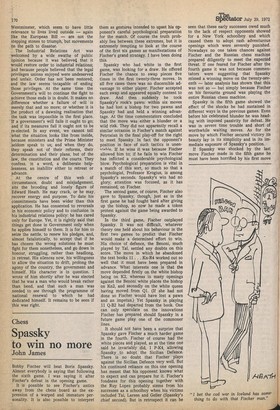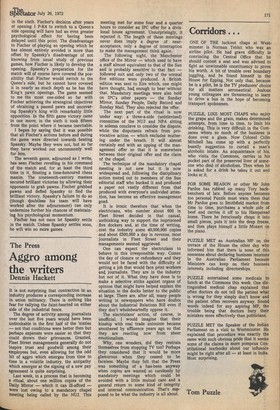Chess
Spassky to win no more
John James
Bobby Fischer will beat Boris Spassky. Almost everybody is saying that following the sixth game. I was saying it after Fischer's defeat in the opening game.
It is possible to see Fischer's antics away from the chess board as the expression of a warped and immature personality. It is also possible to interpret
them as gestures intended to upset his opponent's careful psychological preparation for the match. Of course the truth probably lies between these extremes, but it is extremely tempting to look at the course of the first six games as manifestations of Fischer's grand strategy. I have been doing this.
Spassky who had white in the first game, was looking for a draw. He offered Fischer the chance to swap pieces five times in the first twenty-three moves. In all five cases there was no discernible advantage to either player. Fischer accepted each swap and appeared equally content to draw. And then suddenly he took Spassky's rook's pawn: within six moves he had lost a bishop for two pawns and Spassky had and held a winning advantage. At the time commentators concluded that the move was either a blunder or a wild risk. They did not apparently recall a similar occasion in Fischer's match against Petrosian in the final play-off for the right to meet Spassky. In fact the opponent's position in face of such tactics is unenviable. If he wins it was because Fischer allowed him to; if he fails to win Fischer has inflicted a considerable psychological blow. Psychological preparation is vital in a match of this sort, so much so that a psychologist, Professor Krogius, is among Spassky's seconds. Spassky's win had no glory; attention was focused, as it has remained, on Fischer.
The second game, of course, Fischer also gave to Spassky, though, just as in the first game he had fought hard after giving up the bishop, so now he made a token protest against the game being awarded to Spassky.
In the third game, Fischer outplayed Spassky. It was not difficult, whatever theory one held about his behaviour in the first two games to predict that Fischer would make a determined effort to win. His choice of defence, the Benoni, much played by Tal, settled any doubts on this score. The move in which he abandoned the text books 11 . . . Kn-R4 worked out so well that it must have been prepared in advance. What interests one is that the move depended firstly on the white bishop being on K2, whereas in many openings against the Benoni white places the bishop on Kn2, and secondly on the white queen having moved from Ql. (If she had not done so Fischer would have lost a pawn and an impetus.) Yet Spassky in playing 11 Q-B2 had departed from the book. One can only speculate on the innovations Fischer has prepared should Spassky in a future game play one of the commoner lines.
It should not have been a surprise that Spassky gave Fischer a much harder game in the fourth. Fischer of course had the white pieces and played, as at the time one said he invariably did, 1 P-K4, allowing Spassky to adopt the Sicilian Defence. There is no doubt that Fischer plays against the Sicilian Defence very well. But his continued reliance on this one opening has meant that his opponent knows what to expect and can prepare for it. Fischer's fondness for this opening together with the Ruy Lopez probably stems from his successes as a schoolboy when his victims included Tal, Larsen and Geller (Spassky's chief second). But in retrospect it can be
seen that these early successes owed much to the lack of respect opponents showed for a New York schoolboy and which caused them to adopt rash adventurous openings which were severely punished. Nowadays no one takes chances against Fischer and the Russian chess machine prepared diligently to meet the expected threat. If one feared for Fischer after the fourth game it was not because commentators were suggesting that Spassky missed a winning move on the twenty-seventh — later analysis has shown that this was not so — but simply because Fischer on his favourite ground was playing the entire Russian chess machine.
Spassky in the fifth game showed the effect of the shocks he had sustained in different ways in the previous games. Even before his celebrated blunder he was heading with imposed passivity for defeat. He was in severe time trouble and short of worthwhile waiting moves. As for the move by which Fischer secured victory its beauty lay in its simplicity and in its immediate exposure of Spassky's position.
If Spassky was shocked by the last move Fischer made in the fifth game he must have been horrified by his first move in the sixth. Fischer's decision after years or opening 1 P-K4 to switch to a Queen's side opening will have had an even greater psychological effect for having been delayed until this point. The disadvantage to Fischer of playing an opening which he has almost entirely avoided is more than offset by Spassky's disadvantage of not knowing from usual study of previous games, how Fischer is likely to develop the opening. Spassky's preparation for the match will of course have covered the possibility that Fischer would switch to the Queen's side, but he cannot have covered it in nearly as much depth as he has the King's pawn openings. The game seemed to me the most one-sided so far with Fischer achieving the strategical objectives of obtaining a passed pawn and uncovering Spassky's king with remarkably little opposition. In the fifth game victory came in one move; in the sixth it took fifteen from the point where it became inevitable.
I began by saying that it was possible that all Fischer's actions before and during the game were directed towards beating Spassky. Maybe they were not, but so far they have worked out uncommonly well for him.
The seventh game, adjourned as I write, has seen Fischer revelling in his command of the match and, for at least the third time in it, flouting a time-honoured chess maxim. The nineteenth-century masters secured brilliant victories by allowing their opponents to grab pawns. Fischer grabbed pawns and defied Spassky to find the brilliant victory. Spassky's failure to do so (though doubtless his team will have worked after the adjournment) can only undermine further his chances of maintaining his psychological momentum.
Fisdher has not once let Spassky settle in the match. Unless Spassky settles soon, he will win no more games.









































 Previous page
Previous page